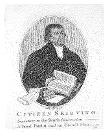William Skirving, the son of a wealthy farmer in Midlothian, Scotland, was educated at Haddington Grammar School and the University of Edinburgh. In the early 1790, his liberal political views had translated to activism with Scottish societies sympathetic to the French Revolution; in 1792, he was secretary to the Edinburgh convention of the Societies of the Friends of the People. Skirving continued working with the radical societies even after the convictions of other members like Thomas Muir and Thomas Fyshe Palmer, and in January 1794 he was tried and convicted of sedition at Edinburgh. Along with Muir, Palmer and Maurice Margarot, he was transported to New South Wales on the Surprize in May 1794.
Subjected to harsh treatment on the voyage after accusations of attempted mutiny, Skirving arrived at Sydney in poor health. He died there in March 1796.
See related entry.
 5693716316754792780.gif
5693716316754792780.gif